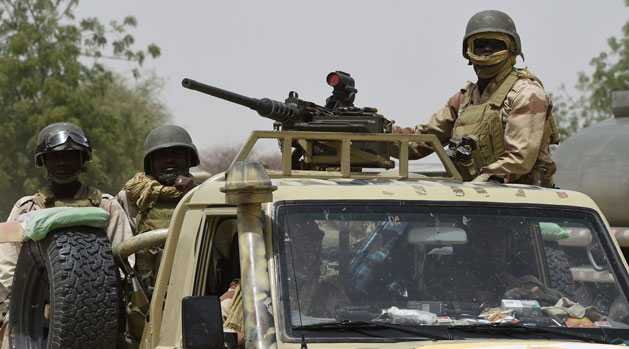Nigerian army 'rescues 200 girls' from Boko Haram stronghold
The hostages are still being identified, and it is unclear if they are the missing schoolgirls from Chibok

A free daily email with the biggest news stories of the day – and the best features from TheWeek.com
You are now subscribed
Your newsletter sign-up was successful
The Nigerian army says it has rescued 200 girls and 93 women from a Boko Haram stronghold in the north of the country, as part of a major ongoing operation.
It remains unclear if any of the victims are among those abducted from Chibok last year, as conflicting reports emerge from the Nigerian military.
The captives are going through a "screening process to find out where they are from", reports Al Jazeera's Yvonne Ndege. The Nigerian military believes some of the women may be wives of Boko Haram fighters and is "not ruling out the possibility that some are from the Chibok school", she says.
The Week
Escape your echo chamber. Get the facts behind the news, plus analysis from multiple perspectives.

Sign up for The Week's Free Newsletters
From our morning news briefing to a weekly Good News Newsletter, get the best of The Week delivered directly to your inbox.
From our morning news briefing to a weekly Good News Newsletter, get the best of The Week delivered directly to your inbox.
However, it has been reported that a different military spokesperson told the Associated Press that they "are not the Chibok girls". The women and girls, who were rescued from the Sambisa Forest in the northeast of the country, are currently being interviewed by police and the military.
A community leader from Chibok said he was "working hard to verify" if any of the girls were among those kidnapped from his village. "His comments reflected a distrust of the military, which has published many misstatements about the girls," says Al Jazeera.
It is estimated that the Islamist militants have captured more than 500 women and girls since they began their violent insurgency in 2009. The largest single abduction occurred when 276 schoolgirls were taken from Chibok in April last year, causing global outrage and sparking an international campaign to rescue them. Boko Haram leader Abubakar Shekau vowed to "marry them off" or sell them as slaves.
In recent months, the Nigerian military has made significant gains against the Islamist group, taking back swathes of territory in the north. But the groups' deadly attacks continue, with civilians bearing the brunt of the violence. Hundreds of decomposing bodies, including those of women and children, were discovered in shallow graves after the military recaptured the city of Damasak last week.
A free daily email with the biggest news stories of the day – and the best features from TheWeek.com
Boko Haram's rebellion, and the military offensive against it, has killed more than 15,500 people since 2012, according to the BBC. The ability to tackle the insurgency will be the true test of newly elected President Muhammadu Buhari, who assumes power next month.
-
 The 8 best TV shows of the 1960s
The 8 best TV shows of the 1960sThe standout shows of this decade take viewers from outer space to the Wild West
-
 Microdramas are booming
Microdramas are boomingUnder the radar Scroll to watch a whole movie
-
 The Olympic timekeepers keeping the Games on track
The Olympic timekeepers keeping the Games on trackUnder the Radar Swiss watchmaking giant Omega has been at the finish line of every Olympic Games for nearly 100 years
-
 Epstein files topple law CEO, roil UK government
Epstein files topple law CEO, roil UK governmentSpeed Read Peter Mandelson, Britain’s former ambassador to the US, is caught up in the scandal
-
 Iran and US prepare to meet after skirmishes
Iran and US prepare to meet after skirmishesSpeed Read The incident comes amid heightened tensions in the Middle East
-
 Israel retrieves final hostage’s body from Gaza
Israel retrieves final hostage’s body from GazaSpeed Read The 24-year-old police officer was killed during the initial Hamas attack
-
 China’s Xi targets top general in growing purge
China’s Xi targets top general in growing purgeSpeed Read Zhang Youxia is being investigated over ‘grave violations’ of the law
-
 Panama and Canada are negotiating over a crucial copper mine
Panama and Canada are negotiating over a crucial copper mineIn the Spotlight Panama is set to make a final decision on the mine this summer
-
 Why Greenland’s natural resources are nearly impossible to mine
Why Greenland’s natural resources are nearly impossible to mineThe Explainer The country’s natural landscape makes the task extremely difficult
-
 Iran cuts internet as protests escalate
Iran cuts internet as protests escalateSpeed Reada Government buildings across the country have been set on fire
-
 US nabs ‘shadow’ tanker claimed by Russia
US nabs ‘shadow’ tanker claimed by RussiaSpeed Read The ship was one of two vessels seized by the US military